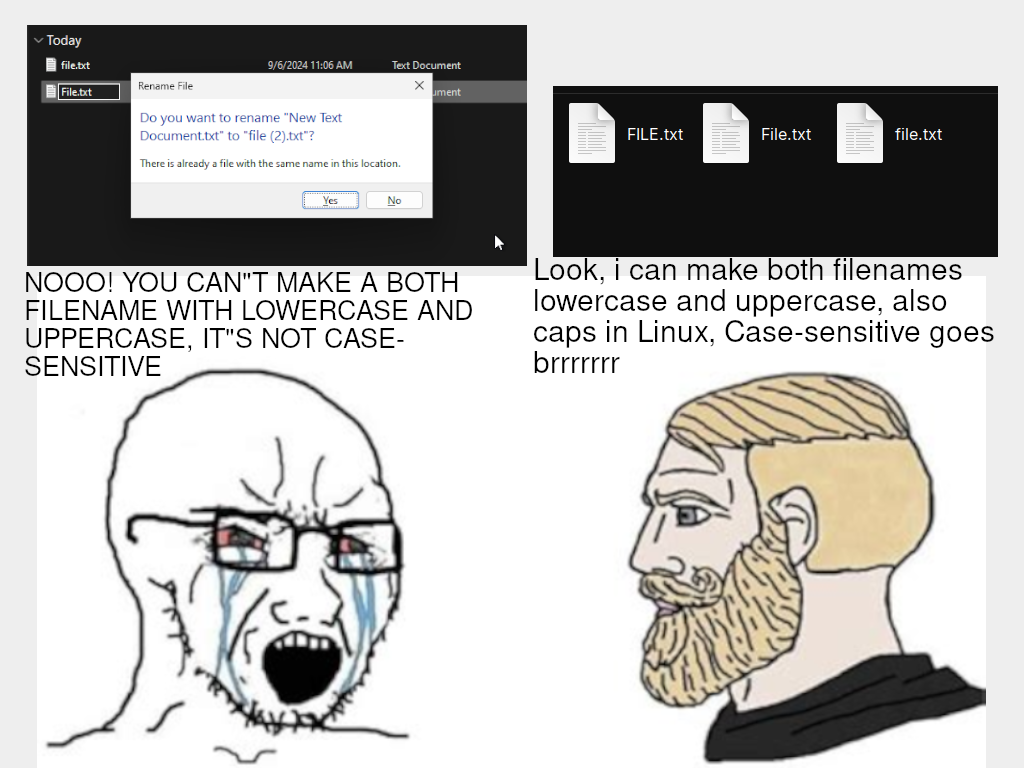this post was submitted on 06 Sep 2024
615 points (90.6% liked)
linuxmemes
21699 readers
2084 users here now
Hint: :q!
Sister communities:
Community rules (click to expand)
1. Follow the site-wide rules
- Instance-wide TOS: https://legal.lemmy.world/tos/
- Lemmy code of conduct: https://join-lemmy.org/docs/code_of_conduct.html
2. Be civil
- Understand the difference between a joke and an insult.
- Do not harrass or attack members of the community for any reason.
- Leave remarks of "peasantry" to the PCMR community. If you dislike an OS/service/application, attack the thing you dislike, not the individuals who use it. Some people may not have a choice.
- Bigotry will not be tolerated.
- These rules are somewhat loosened when the subject is a public figure. Still, do not attack their person or incite harrassment.
3. Post Linux-related content
- Including Unix and BSD.
- Non-Linux content is acceptable as long as it makes a reference to Linux. For example, the poorly made mockery of
sudoin Windows. - No porn. Even if you watch it on a Linux machine.
4. No recent reposts
- Everybody uses Arch btw, can't quit Vim, <loves/tolerates/hates> systemd, and wants to interject for a moment. You can stop now.
Please report posts and comments that break these rules!
Important: never execute code or follow advice that you don't understand or can't verify, especially here. The word of the day is credibility. This is a meme community -- even the most helpful comments might just be shitposts that can damage your system. Be aware, be smart, don't fork-bomb your computer.
founded 2 years ago
MODERATORS
you are viewing a single comment's thread
view the rest of the comments
view the rest of the comments

macOS also does this by default, but you can change it (though you have to reformat the disk in question). This is generally fine for non-system disks if you REALLY need it for some reason, but afaik it is not recommended for the OS disk due to assumptions that macOS-targeted binaries make (similar to the windows regex version matching that caused problems for a while because it became the unofficial best way to check windows versions for app install compatibility). It’s doubly annoying on newer Apple systems because the integrated SSDs are WAY faster than pretty much anything else you can connect to it. But for the most part, I find it’s more of a nuisance to keep in mind than a real problem (I’ve been dealing with dev-issue MBPs since about 2012).
As in the windows case, this is also an appropriate choice for the average Apple user (though the fact that they’re fairly ubiquitous as dev machines in many places is annoying on several levels, despite the generally solid best-case performance and thermals I’ve observed).
Huh I had thought case-sensitive was default on APFS/HPFS and you had to choose insensitive specifically but I guess not
Just checked on my work box - if you go into Disk Utility and start the process to add a volume, the default selection is
APFS, and there’s an option in the dropdown for forAPFS (Case-sensitive)